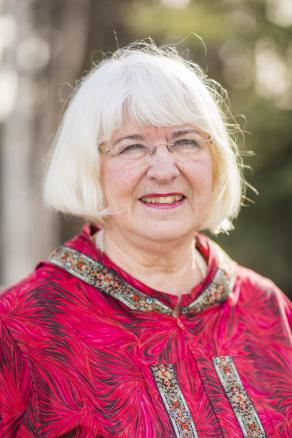Rural Alaska Honors Institute program manager to retire after 30 years
October 23, 2018
Leona Long
907-474-5086
“Denise has been an essential part of RAHI for decades,” said Sandra Kowalski, director of Indigenous programs for rural, community and Native education. “Much of RAHI’s success can be attributed to Denise’s hard work and commitment to serving Alaska Native and rural students. Through her work with RAHI, Denise has positively impacted more than 1,900 alumni and helped them on their path to success.”

Wartes began her tenure at UAF as an assistant to the dean in the College of Liberal Arts. Her work with RAHI began as a temporary position helping enroll a new batch of students when the RAHI secretary was unable to come to work. Wartes has served as program manager since 1989. In addition to overseeing all aspects of the program, she also raises funding so that students attend the program for free.
Originally from northern Michigan, Wartes moved to Alaska’s Arctic Slope the day after marrying her husband, Mark. Their family lived a subsistence lifestyle on the edge of the Arctic Ocean, where their two children were born. They moved to Fairbanks in 1980.
“We were very fortunate to live on Alaska’s North Slope prior to the development of the oil fields,” said Wartes. “The lifestyle we experienced really doesn’t, and can’t, exist anymore. We lived on a remote homestead, 180 miles east of Barrow. Living in the Arctic has helped me relate to the Alaska Native and rural students I serve.”
Wartes earned her degrees from UAF by taking a course or two at a time while working and raising her children. She earned an associate degree in 1996 followed by an interdisciplinary bachelor’s degree in Alaska Native studies and business at UAF in 2001. She eventually obtained a master’s degree in cross-cultural studies.
Recruitment for the position will begin in the coming weeks so the new manager can work with Wartes into the summer.
Since its inception in 1983 at the request of the Alaska Federation of Natives, RAHI has prepared almost 1,900 rural and Alaska Native high school students to adjust academically and socially to college life. The college bridge program squeezes a semester’s worth of rigorous academics, community service projects and university life into six weeks. In addition to required courses in English, library science and study skills/transition to college, traditional RAHI students choose from electives in process technology, business, chemistry, education, Alaska Native languages or math. Three times a week, students participate in karate, yoga or Alaska Native dance classes.
For many Alaska families, the program has become a family tradition, with more than 150 second-generation alumni who were inspired to attend by a sibling's or parent's life-changing experience. RAHI is made possible by financial support from the UAF College of Rural and Community Development and sponsors, including Wells Fargo, Alyeska Pipeline Service Co., Arctic Slope Community Foundation, First National Bank of Alaska, Sitnasuak Native Corp., Shell, New York Life, Kuukpik, ConocoPhillips, Educators Rising, Donlin Gold, Ravn Alaska, Boeing and Crowley. Students attend for free and have their travel expenses paid.
For more information, visit www.uaf.edu/rahi/ .


